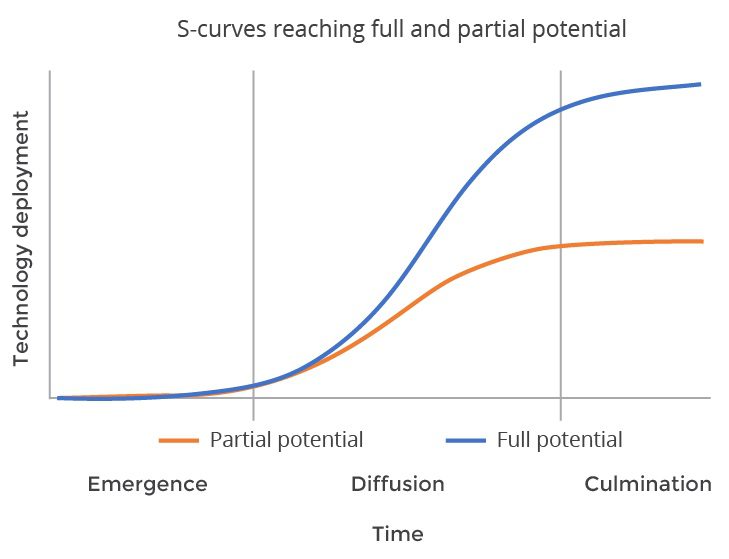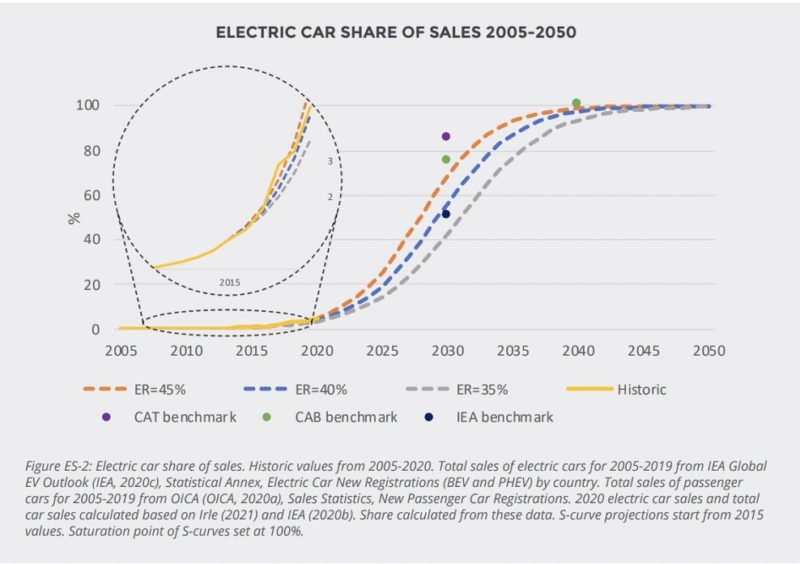A new report published this week by the We Mean Business coalition and conducted by the University College London’s Institute for Sustainable Resources has highlighted the “S-curve” growth of electric vehicle (EV) adoption around the globe, a tell-tale sign of historical technological innovation.
Technological innovation, according to the authors of the report, does not follow a linear progression, and has repeatedly left “industry leaders, policy makers, and experts … surprised by the pace at which new technologies transform markets and societies.
“From horses to cars, landlines to mobile phones, or videos to streaming. Technological innovation tends to follow the ‘S-curve’: initially slow but incremental uptake (slight curve), followed by disruptive and radical diffusion (steeper curve) and finally culmination and stabilization (flattening curve).”
The report shows how the uptake of electric vehicles is now surging on its own and, if supported by the right policies and investments, could play a significant role in limiting global warming and halting temperature rises at the 1.5°C mark.
Transportation around the globe currently accounts for approximately a quarter of energy-related CO2 emissions, of which 45% is due to passenger road vehicles.
As such, it is vital that the transportation sector is able to sustain and extend the transition towards zero-emission vehicles.
Previous research by the Energy Transition Commission, an international think tank focusing on economic growth and climate change mitigation, predicted that consumers would begin preferring electric vehicles over petrol and diesel vehicles by 2024.
But the new report goes a step further and demonstrates that global EV sales have increased by an average of 41% per year since 2015, and if growth along this S-curve continues, all new vehicles sold by 2040 could be electric.
“The projections show that recent EV growth rates are consistent with S-curve shaped uptake dynamics, that would reach future benchmarks consistent with the goals of the Paris Agreement,” said Michael Grubb, Professor of Energy and Climate Change at UCL Institute for Sustainable Resources.
“If the right policies sustain the current rates of S-curve growth, we will hit benchmarks for more than half of new sales globally to be electric by 2030 – and soon after that, all new passenger vehicles sold could be zero emissions.”
The report also points out that the current climate crisis demands that we can and should be pushing faster and harder so as to halve emissions by 2030 and support a net zero future by 2050.
To do this, we need to accelerate EV adoption so all vehicles are electric by 2035, not 2040.
“Businesses and consumers are embracing EVs,” added Sophie Punte, Managing Director of Policy, We Mean Business coalition. “Just like cars replaced horses a century ago, EVs will replace petrol and diesel cars. Governments now have the chance to put the right policies and infrastructure in place so that EVs fully contribute to halving emissions by 2030.”
The report – which also highlights the rapidly falling costs of battery technology and the long-term, total cost of ownership benefits of EV ownership over ICE vehicles – finds that “a rapid transition is underway and appears to be unstoppable.”
However, the focus of the report turns from demonstrating the rapid uptake of EVs towards the need for the right policies and investments to support and accelerate this transition.
Key amongst the report’s recommendations to accelerate the EV transition is the need to systemise charging infrastructure and system integration.
Already, according to the report, the global availability of publicly accessible charging equipment has grown 82% per year on average between 2010 and 2019. But this needs to be supported by the right policies and investments to ensure even coverage as part of a “just transition”.
Governments must also support EV adoption by introducing policies to support EV adoption, such as facilitating a leasing system and second-hand market for EVs and its batteries, and the creation of alternative ways to generate revenue for infrastructure expansion and maintenance.
Similarly, governments must seek to implement policies to support supply and demand for the EV sector, such as supporting domestic EV manufacturing and supply chains and committing to public procurement of EVs.
Finally, the report highlights the need to look beyond passenger EVs as a means to reducing the transport sector’s impact on the environment.
Zero emission and electric vehicle policies need to also cover light duty commercial vehicles and buses, and government policies need to continue improving energy efficiency and supporting low emission fuels for all modes of transport.
Joshua S. Hill is a Melbourne-based journalist who has been writing about climate change, clean technology, and electric vehicles for over 15 years. He has been reporting on electric vehicles and clean technologies for Renew Economy and The Driven since 2012. His preferred mode of transport is his feet.



